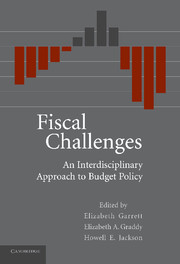Book contents
- Frontmatter
- Contents
- Preface
- Contributors
- PART ONE THE LAW AND POLITICS OF FISCAL POLICY
- 1 The Congressional Budget Process
- 2 Budget Gimmicks
- 3 Transparency in the U.S. Budget Process
- 4 European Experiences with Fiscal Rules and Institutions
- Part One Bibliography
- PART TWO UNDERSTANDING FEDERAL DEFICITS AND PUBLIC DEBT
- PART THREE BUDGETING AND FISCAL CONSTRAINTS AT THE STATE LEVEL
- PART FOUR INTERGOVERNMENTAL ASPECTS OF BUDGET POLICY
- PART FIVE JUDICIAL POWERS AND BUDGET POLICY
- Index
1 - The Congressional Budget Process
Published online by Cambridge University Press: 23 December 2009
- Frontmatter
- Contents
- Preface
- Contributors
- PART ONE THE LAW AND POLITICS OF FISCAL POLICY
- 1 The Congressional Budget Process
- 2 Budget Gimmicks
- 3 Transparency in the U.S. Budget Process
- 4 European Experiences with Fiscal Rules and Institutions
- Part One Bibliography
- PART TWO UNDERSTANDING FEDERAL DEFICITS AND PUBLIC DEBT
- PART THREE BUDGETING AND FISCAL CONSTRAINTS AT THE STATE LEVEL
- PART FOUR INTERGOVERNMENTAL ASPECTS OF BUDGET POLICY
- PART FIVE JUDICIAL POWERS AND BUDGET POLICY
- Index
Summary
HOW IT EVOLVED
“Money is power,” wrote President Andrew Jackson in an 1833 veto message. More than anything else, that equation explains how budgets work. America's congressional budget process evolved from efforts to grasp and disperse that power. This chapter recounts the evolution of the process and then discusses how it works – focusing particularly on the president's budget, Congress' budget resolution, authorizations and appropriations, and the budget reconciliation process.
The Founders
America's founders gave Congress the power over money to provide a check on the president. Article I, Section 9 of the Constitution states the following: “No Money shall be drawn from the Treasury, but in Consequence of Appropriations made by Law.” The founders learned from their study of English history that it was important to separate the power to control the government's money from the power to run the government. They felt that enhancing the legislature's money powers would help to preserve the rights of the people. James Madison summarized the English experience when he wrote in the Federalist Papers, concerning the House of Representatives:
They, in a word, hold the purse – that powerful instrument by which we behold, in the history of the British Constitution, an infant and humble representation of the people gradually enlarging the sphere of its activity and importance, and finally reducing, as far as it seems to have wished, all the overgrown prerogatives of the other branches of the government. This power over the purse may, in fact, be regarded as the most complete and effectual weapon with which any constitution can arm the immediate representatives of the people, for obtaining a redress of every grievance, and for carrying into effect every just and salutary measure.
- Type
- Chapter
- Information
- Fiscal ChallengesAn Interdisciplinary Approach to Budget Policy, pp. 4 - 38Publisher: Cambridge University PressPrint publication year: 2008

